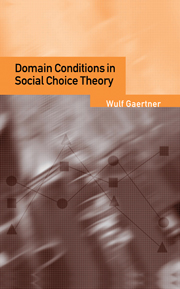Book contents
- Frontmatter
- Contents
- Preface and acknowledgements
- 1 Introduction
- 2 Notation, definitions and two fundamental theorems
- 3 The existence of collective choice rules under exclusion conditions for finite sets of discrete alternatives
- 4 Arrovian social welfare functions, nonmanipulable voting procedures and stable group decision functions
- 5 Restrictions on the distribution of individuals' preferences
- 6 The existence of social choice rules in n-dimensional continuous space
- 7 Concluding remarks
- References
- Author index
- Subject index
6 - The existence of social choice rules in n-dimensional continuous space
Published online by Cambridge University Press: 02 December 2009
- Frontmatter
- Contents
- Preface and acknowledgements
- 1 Introduction
- 2 Notation, definitions and two fundamental theorems
- 3 The existence of collective choice rules under exclusion conditions for finite sets of discrete alternatives
- 4 Arrovian social welfare functions, nonmanipulable voting procedures and stable group decision functions
- 5 Restrictions on the distribution of individuals' preferences
- 6 The existence of social choice rules in n-dimensional continuous space
- 7 Concluding remarks
- References
- Author index
- Subject index
Summary
Throughout chapters 2–5, we studied the aggregation problem within the framework of arbitrary finite sets of discrete alternatives. These alternatives could have been political parties or candidates representing these parties, these alternatives could also have stood for well-specified economic and (or) social programmes determining, for example, particular distributions of commodities and particular tax schemes that involve major indivisibilities.
In various economic problems, the possible choices can be envisaged to constitute a set of points in some appropriately defined multi-dimensional choice space, and the individual preferences are represented by quasi-concave, differentiable utility functions defined over this space. The points are n-dimensional vectors which specify, for example, the final consumptions of both private and public goods of all members of the society under consideration. In the present chapter, we shall examine the existence of continuous aggregation rules within such a framework. We also discuss the issue of manipulability in continuous space.
The standard exclusion conditions in continuous space
Kramer (1973) has shown that for the issue of domain restriction, the transition from finite sets of discrete alternatives to multi-dimensional choice spaces has serious consequences. It is demonstrated that in Euclidean choice space, the standard restriction conditions such as value restriction, extremal restriction and limited agreement are inconsistent with even a modest degree of heterogeneity of individual preferences.
- Type
- Chapter
- Information
- Domain Conditions in Social Choice Theory , pp. 99 - 124Publisher: Cambridge University PressPrint publication year: 2001



